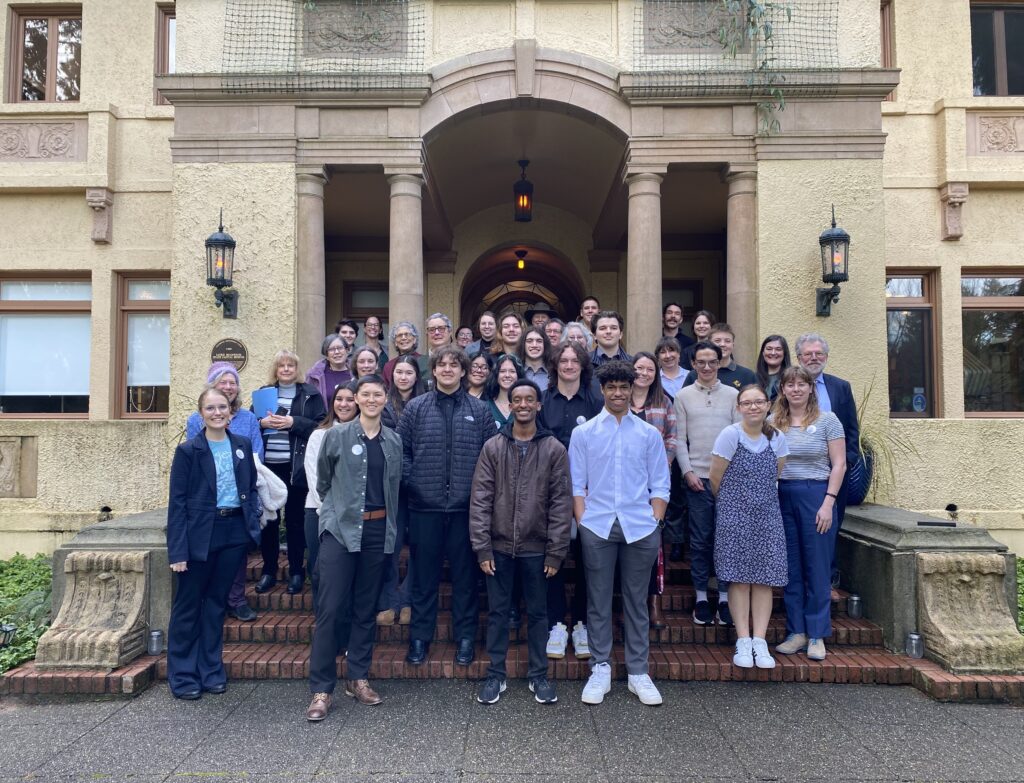2024 was a whirlwind 60-day lawmaking session. It’s often tougher to build the momentum needed to pass landmark bills than in odd-numbered years, when sessions are 105 days and include creating a biennial budget.
But there were some milestone wins for clean energy, protecting salmon, and more. Several vital bills passed the House and Senate, heading to Governor Inslee’s desk to become law. Our deep gratitude to the hundreds of folks who took action with us through the Legislative Action Team email list — these successes were only possible thanks to all of you calling, emailing, and lobbying your legislators. Without further ado, here are a few victories (and missed opportunities) from this winter.
Climate: Electric school buses, protections for solar customers, and less fossil fuels in buildings
Requiring and funding the purchase of zero emission school buses (HB 1368): A big priority for many environmental and health advocates in Washington, this bill will protect kids’ lungs from diesel bus fumes, save public schools money on bus maintenance, and reduce fossil fuel use in the transportation sector — one of the biggest drivers of climate change.
Providing solar consumer protections (HB 2156): Whenever a market gets large enough, scams are inevitable without policies to stop them. The rooftop solar panel market is no different. Thanks to this bill, people seeking to install solar panels can guarantee that they’re getting more accurate information on financing and whether panels are viable for their home. The bill also makes sure solar sellers and installers are properly licensed.
Budget provision for an efficient home energy upgrade “navigator” program: While a more thorough bill (HB 1391) did not pass, your advocacy helped get $3.5 million budgeted for outreach and assistance to ensure Washingtonians can access home and building upgrades that improve health, save money, create jobs, and reduce pollution. This program, to be run by the Department of Commerce, will include help finding qualified contractors, financial incentives and other aid to install heat pumps, better insulation, induction stoves and more.
Transitioning utilities to provide cleaner electricity, less methane gas (HB 1589): Puget Sound Energy (PSE) provides direct gas service to the greater Seattle area, and electric service throughout Northwest Washington. HB 1589 would create regulatory tools to switch PSE utility gas customers to clean electric service while limiting impacts to low-income customers and ensuring benefits to overburdened communities.

Clean water and healthy forests
Protect salmon from toxic tire dust pollution (SB 5931): This bill will expedite the Safer Products for Washington process to more quickly address 6PPD-q pollution, a chemical found in tires and recently identified as a major cause of coho salmon mortality in urban streams. By taking this action, the legislature joins the State of California to explore regulatory action phasing out of this toxic chemical.
Preparing for a water rights adjudication in the Nooksack River (HB 1992 and SB 5828): An adjudication is a thorough analysis of all water usage and rights in a watershed to make sure everyone is getting the water they’re legally entitled to — including tribes, who have a treaty-protected right to fishing. Parts of the Nooksack are struggling to have enough water remaining in the river to support salmon. The Department of Ecology plans to officially launch the adjudication process in April 2024. These bills will add a superior court judge in Whatcom County, as well as establish clear rules for the legal proceedings to help it move along.
Protecting mature and old-growth forests on state land:
In a surprise move, the legislature ended up fully funding all 9 projects proposed for the “Trustland Transfer Program” (TLT) run by the Department of Natural Resources (DNR). TLT is an opportunity for DNR to protect forests that are not optimal for logging given their social and/or ecological value. The legislature allocated $10.8 million to permanently protect over 2,200 acres of state forestlands – including 184 acres of mature and old-growth forest located on Blakely Island (in the San Juans).
The legislature also allocated $15 million from the Climate Commitment Act (CCA) that will go towards protecting additional acres of mature, structurally-complex forests on state public land; however, it appears that our neck of the woods won’t receive any protections this round. We’ll be pushing hard in the 2025 legislative session for the next round of mature forest protections here in NW Washington.
However, if a state ballot initiative (I-2117) aimed at rolling back the CCA is approved by voters this November, forest protections like this won’t be possible.
Missed opportunities: Environmental justice, improved recycling systems
Re-WRAP Act (HB 2049): This was an adjusted version of the 2023 Washington Recycling and Packaging (WRAP) Act to create incentives for companies to reduce packaging, move to packaging that is reusable, compostable, or genuinely recyclable. With too many amendments added, this bill ran out of time in committee and did not make the cutoff to proceed.
CuRB Act (HB 2070): The Cumulative Risk Burden (CuRB) Act would require consideration of pollutants that affect human health when considering permit approvals. If passed, a lead agency would have been able to deny permits for new facilities that add cumulative pollution on identified overburdened communities, while elevating these communities’ voices in the permit evaluation process.
We hope to see both these bills again next year for a longer legislative session. These important and comprehensive bills take time.
Want to help make sure these and other critical bills pass in future sessions? Join 500 of your northwest Washington neighbors on our Legislative Action email list!
